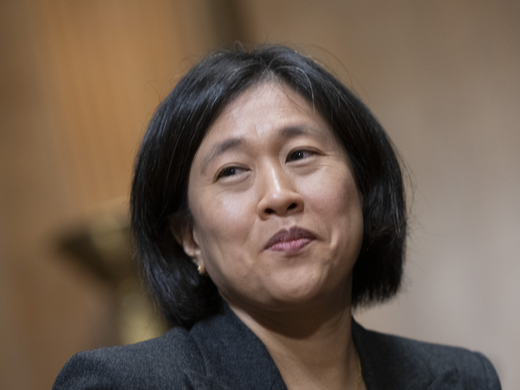In October 2023, America’s digital trade negotiator made a startling announcement at the World Trade Organization (WTO). The negotiator spoke at the behest of US Trade Representative (USTR) Ambassador Katherine Tai. He said that because Congress and various US regulatory agencies were considering new regulations for large tech companies, the United States would no longer support language at the WTO related to cross-border data flows. The Office of the USTR followed up by stating that the United States now needs “policy space” to regulate the tech giants.
Although the USTR stressed that the United States would continue to participate in the trade talks to set rules on e-commerce, the arguments sent shock waves through the trade, tech, human rights and diplomatic communities. Many are concerned about how such a policy reversal might affect US credibility as a negotiating partner. Moreover, the policy reversal does not make sense given America’s dominant position as a leader of the data-driven global economy. But in searching for an explanation, some observers blamed Trump. They hypothesized that the Biden administration had taken this step to assuage Americans who lean protectionist, in the hopes of enticing them away from the likely Republican candidate, former president Donald Trump.
Whatever the reason, the decision seemed out of touch with the times. Most economies today are built on a foundation of data. Where nations once grew rich solely from their natural resources and/or human capital, nations today also rely on their citizens’ ability to collect, analyze, and create goods and services built on large pools of data. Data is multidimensional — the same data set can be both a commercial asset and a public good, which governments should provide and regulate effectively.
Data also underpins the global internet. The United States has long led efforts to encourage the cross-border data flows that sustain the internet. In 1997, then president Bill Clinton announced the Framework for Global Electronic Commerce, which stated, “The U.S. government supports the broadest possible free flow of information across international borders....The Administration...will develop an informal dialogue with key trading partners...to ensure that differences in national regulation...do not serve as disguised trade barriers.” The framework was later adopted by members of the Organisation for Economic Co-operation and Development and served as the basis for language in early bilateral and regional e-commerce agreements. At the beginning of discussions regarding e-commerce at the WTO, the United States drafted a 2019 white paper outlining the economic, social and political benefits of the free flow of data.
For the past 15 some years, the United States has included language in trade agreements calling for the free flow of data/information as well as language limiting how and when other nations can erect barriers to digital trade. For example, the Japan-US Commercial and Industrial Partnership, issued on November 14, 2023, notes, “We will continue collaborating to facilitate cross-border data flows and effective data and privacy protections globally[,] in support of our efforts to enable cross-border data flows and operationalize Data Free Flow with Trust.” The United States has also drafted and supported language at the most recent G7 and G20 meetings, and for good economic reason: digital trade underpins traditional trade in goods and services, but digital trade is growing faster than traditional trade.
Support for the free flow of data is not just integral to trade policy — it is essential to the open internet and US support of democracy around the world. The US-led Declaration for the Future of the Internet commits signatories to “promote our work to realize the benefits of data free flows with trust based on our shared values as like-minded, democratic, open and outward looking partners.” In its 2022 National Security Strategy, the Biden White House asserted that the United States is “rallying like-minded actors to advance an international technology ecosystem that… promotes the free flow of data and ideas with trust, while protecting our security, privacy, and human rights, and enhancing our competitiveness” (emphasis added).
The free flow of information is also essential to US competitiveness in various forms of artificial intelligence (AI). All types of AI require constant updating and new sources and types of data. Generative AI in particular is widely used by individuals and firms around the world, but is often built on inaccurate, biased and incomplete data sets. The best way to improve generative AI is to increase the quality and supply of data that underpins it. In so doing, AI developers will be better able to filter the data set to ensure it is accurate, complete and representative. AI developers, deployers and users will be better off if this data is obtained through an accountable, transparent set of rules negotiated globally, such as at the WTO.
As the Clinton administration noted more than 26 years ago, there is no data-driven economy without trust. The Biden administration has dramatically altered longstanding US policy without an open public debate. Although many policy makers have long pushed the United States to regulate our data behemoths, our allies are concerned and confused by the decision to abandon these talks and what it means for US accountability and reliability. New regulation of tech giants to ensure consumer protection is very much needed, but this regulation should not come at the expense of the data flows that underpin our society.
A version of this article first appeared in Fortune.



